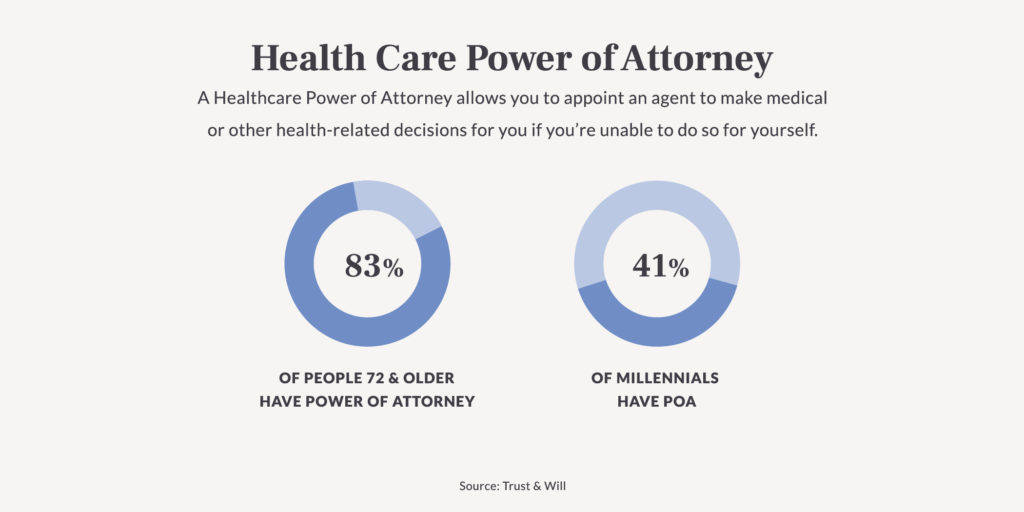A Power of Attorney (POA) is an incredibly important piece of your Estate Planning efforts. Your POA allows you to appoint another person, known as an “agent,” to act in your place. An agent can step in to make financial, medical or other major life decisions should you become incapacitated and no longer able to do so. There are several types of POAs, and it can be a bit confusing to navigate the process of choosing the right one on your own.
Knowing which POA is right for you and your needs is critical. Take the time to learn about your options before you decide on which POA is best-suited for your goals, needs and stage of life you’re at.
Learn all about POAs in this What is a Power of Attorney guide. Keep reading to hear more about:
What Does a Power of Attorney Do?
The person you appoint as your Power of Attorney is known as a fiduciary – someone who is responsible for managing the affairs of another. Depending on the type of POA that’s in effect, the powers your agent can exercise could have a wide range of authority.
At the most basic level, your POA will act on your behalf if you become unable to do so for yourself. This can involve anything from health-related decisions to financial decisions and more.
Types of Power of Attorney
Since there are several types of POAs, it’s really important you know and understand the differences between each so you can choose the best one specifically for your needs.
General Power of Attorney
A General Power of Attorney is a broad way to give an agent very general powers to act on your behalf. General POAs typically can do the following:
Buy life insurance
Conduct business transactions
Employ professional help
Handle financial or real estate transactions
Make gifts
Operate business interests
Settle claims
When to Choose General Power of Attorney: This type of POA can be very effective if you become suddenly mentally or physically incapacitated. Or, for example, if you are out of the country for an extended period of time. General Power of Attorneys are often a part of a larger Estate Plan to ensure someone is appointed to handle your financial matters if you can’t.

Financial Power of Attorney
A Financial Power of Attorney designates an agent the authority to make financial decisions and act on your behalf should you not be able to. This type of POA can be broad or very specific. It’s another title for General POA, and could typically grant all the same actions listed above.
Special Power of Attorney
A Special Power of Attorney allows you to specify what powers you’re authorizing an agent to exercise. For example, Special Power of Attorneys might be asked to handle the following:
Collect debts
Handle business transactions
Manage real estate
Sell personal or real property
When to Choose Special Power of Attorney: Special Power of Attorneys are commonly used when you can’t take care of your own affairs because of health-related issues or other commitments.
Healthcare Power of Attorney
A Healthcare Power of Attorney allows you to appoint an agent to make medical or other health-related decisions for you if you’re unable to do so for yourself. Healthcare POAs can:
Choose doctors or other care providers
Decide on living arrangements should you need long-term care (like choosing assisted living, memory care or rehab facilities)
Hire caregivers for basic needs like food and bathing
Make all decisions regarding medical care including surgeries, tests, medication and more
When to Choose Healthcare Power of Attorney: Healthcare Power of Attorneys are smart for any adult over the age of 18. Without one, you’ll have no say in who makes decisions about your health if you suddenly can’t. Keep in mind that a Healthcare Power of Attorney is not necessarily the same thing as a Living Will. Some states allow certain preferences to be included in a Living Will, such as whether or not you’d want to be on life support. And in some states you can combine aspects of a Living Will and a Healthcare POA into a separate legal document called an Advanced Healthcare Directive (AHCD). Be sure you know what your state allows.
Durable Power of Attorney
A Durable Power of Attorney is just a different type of a Financial POA. Both give legal rights to an agent so he or she can step in to deal with any non-medically-related issues or affairs. The big difference is this: the “durable” part establishes that the POA should remain intact if you are incapacitated in any way. Durable POAs can:
Act on your behalf even if you become incapacitated
Execute financial decisions (both business and personal)
Make all healthcare decisions
Sign legal documents
When to Choose Durable Power of Attorney: A Durable Power of Attorney might be a smart choice if you want to prepare for the possibility of suddenly becoming incompetent as a result of an accident or illness.
Springing Power of Attorney
Springing POAs (also sometimes called Conditional POAs) are a common request by many people going through the Estate Planning process. This type of POA only goes into effect once you lose capacity, and it’s a popular option because people seem to like the idea of having something in place “just in case,” without giving up any control now.
However, it’s important to note that Springing POAs can be a difficult option. The biggest issue is proof. Since this type of Power of Attorney only goes into effect after you’re incapacitated, there could easily be (and often is) a necessity to prove incapacitation. This sometimes even requires a court order, which can be a lengthy process during a very time-sensitive period.
Springing POAs can:
Possibly make medical decisions (although there are often complications due to HIPPA privacy laws)
Potentially handle financial affairs (however there could be long delays if proof of incapacitation is required)
When to Choose Springing Power of Attorney: Springing POAs are not necessarily a great option for everyone. They might be a good choice for a member of the Armed Forces who is deployed overseas, or a similar situation.
The Difference between Health and Financial POAs
The difference between a Health and a Financial POA is exactly what you think. Health POAs allow you to appoint an agent to act on your behalf regarding health-related matters. A Financial POA does this for all other financial-related issues in your life. Decisions could be in relation to business or personal financial issues, or a combination of the two.
Who Needs a Power of Attorney?
If you are a legal adult, you should consider a POA. The type you choose depends on several factors, including age, mindset, future life goals and more. If you’re considering appointing someone in your life the legal right to act on your behalf, you should definitely consider a POA.
College Students: Maybe you’re thinking about a Healthcare POA to ensure your family knows your wishes should you fall ill or have a serious accident.
Newly Retired: A Durable POA can put something in place now, while you’re healthy. You may not be able to do this in the future as your health and mental capacity begin to decline with age.
New Parents: You suddenly have a lot more responsibility on your plate. Rest easy knowing you’ve established someone who can step in and make those tough decisions if you suddenly can’t. A Durable POA can be an ideal choice as it will stay in effect should your life drastically change and you can’t make your own decisions any longer.
Business Owners: Do you have a successful business? Even if you’re young, healthy and confident you won’t need any serious medical care in the near future, life is unpredictable. You have a lot at stake with the financial aspects of running a business. Be prepared for the unexpected. Maybe a Special POA is what you need.
Newly Diagnosed: We never want to think about being anything less than in picture perfect health. But if that’s not the case, and you’ve recently received news from your doctor, it’s time to start thinking about your future. Start the process of appointing an agent to serve as your POA sooner than later. It will be one less thing you have to think about as you navigate the often difficult waters of treatment.
How to Get a POA
You can get a POA in just a few simple steps. There may be some slight differences depending on the type of POA you want to use and what state you live in, but for the most part you can follow the basic steps below.
Many states have standard form POAs available. It’s typically not required that you use a state-approved form, but it may be helpful. Banks and medical facilities will be familiar with a state-specific standardized form, which could make the process simpler for your agent if he or she needs to act.
Using forms other than your state’s is perfectly legal, but know that most banks (and others) will require an internal legal review on their end before they accept documents and allow your agent to make decisions and transactions for you. This process could take several days or even weeks in some cases, which could be problematic and stressful.
1. Decide Which Type Of Power Of Attorney Is Best For Your Situation
First and foremost, you need to decide which type of Power of Attorney is best for you, your life and your situation. By now you understand the different types of POAs that are available. Simply choose the one that best-suits your current scenario and your goals for the future.
2. Choose Who You’d Like To Act as Your Agent
For some, this is the hardest part of the process. Deciding who you trust to make decisions on your behalf may feel a bit daunting. Try to choose someone in your life who’s trustworthy and reliable. You can designate more than one person to have POA, but at the very least you should have one primary and one back up person named. If you do name multiple people, be sure to clearly state how they must act (jointly or separately) when making decisions.
3. Choose A Site To Make Your Online Will
Creating a Will is an important part of the Estate Planning process. If you don’t have one yet, you can create a valid Will, along with your POA, online at a site like Trust & Will. There are many options out there for you to create your online Will, but they’re not all the same. When you use Trust & Will, you can confidently draft and finalize your Will and appoint a POA per your state’s standardized forms. Trust & Will makes it as easy as possible to handle all your affairs in one simple, streamlined process.
Trust & Will is fast, affordable, thorough and designed by legal experts and lawyers who understand the nuances of Estate Planning. When you use Trust & Will, you’re guaranteed satisfaction.
4. Make Your Power Of Attorney Legally Binding
In order to be legally binding, your POA must be signed and notarized. You should certify multiple copies so your POA can readily act if the time comes. Almost any decision or transaction a POA will make on your behalf will require a certified copy of the legal POA.
Difference between General Power of Attorney and Durable Power of Attorney
The difference between a General POA and a Durable POA is simple.
A General POA: General POAs end as soon as you are incapacitated. While this tool is great for many things in life, it is not a solid option for end-of-life decisions.
A Durable POA: A durable POA stays in effect until you pass away or revoke its power. In essence, it means your agent’s authority remains in place even if you become incapacitated. Thus, he or she could make important decisions for you even after you are unable to do so yourself.
There are some occasions where a court will step in and legally end a Durable POA. One final note is that it’s important to know if your state automatically considers a POA durable. In some states, this is the case and if you want otherwise, you must directly say so in your documents.
Other Common Questions about POA
What Does Power of Attorney Allow Me To Do?
Appointing Power of Attorney allows you to name a person or persons, known as your “agent,” to make health and/or financial decisions on your behalf.
Can You Appoint Multiple Power Of Attorneys?
Yes, you can appoint more than one Power of Attorney. If you designate more than one person, be sure to clearly note how you want them to act. You can specify if they must act jointly or if they can act independently. If you only choose one POA, you should consider having a backup designation.
Can Your Choice For Power Of Attorney Be Questioned?
The choice you make for your Power of Attorney is generally accepted, as long as you are of sound mind when you sign the document. However, its validity can come into question if your mental competency is ever questioned. Depending on which type of POA you choose and how it’s worded, your agent may need to get confirmation from your doctor that you are incapacitated so he or she can begin acting on your behalf.
What Is The Uniform POA Act
The Uniform Power of Attorney Act (UPOAA) was created by the Uniform Law Commission in 2006 to establish universal rules for POAs across the states. The law states what powers are included by default, versus which need to be stated outright.
What Can’t My POA Do?
There are varying degrees of power a POA can give your agent, and they can depend on the type of POA as well as your explicitly stated wishes within the document. However, there are certain things agents can’t do. For example, an agent can’t:
Break their fiduciary duty
Change your Will
Make any decisions after your death – unless he or she is named the Executor of your Will or Trust. If you don’t have Estate Planning documents naming an Executor, an agent can petition to become appointed your Personal Representative after you pass.
Transfer the POA to another agent
How Can Power Of Attorney End?
There are four basic reasons a POA’s authority could end.
You can revoke it (cancel it).
You can include an expiration date.
You pass away.
You become incapacitated or mentally incompetent and do not have a Durable POA.
What Is The Difference Between An Agent And A Principal?
You are the principal, and the person you appoint is the agent. Nobody wants to think about dealing with needing a Power of Attorney, but the fact is, there may come a time when you need one. Being prepared is not only smart, it’s reassuring. It means you can have faith that someone with your best interest at heart will be there during the time you may need it most.












Share this article